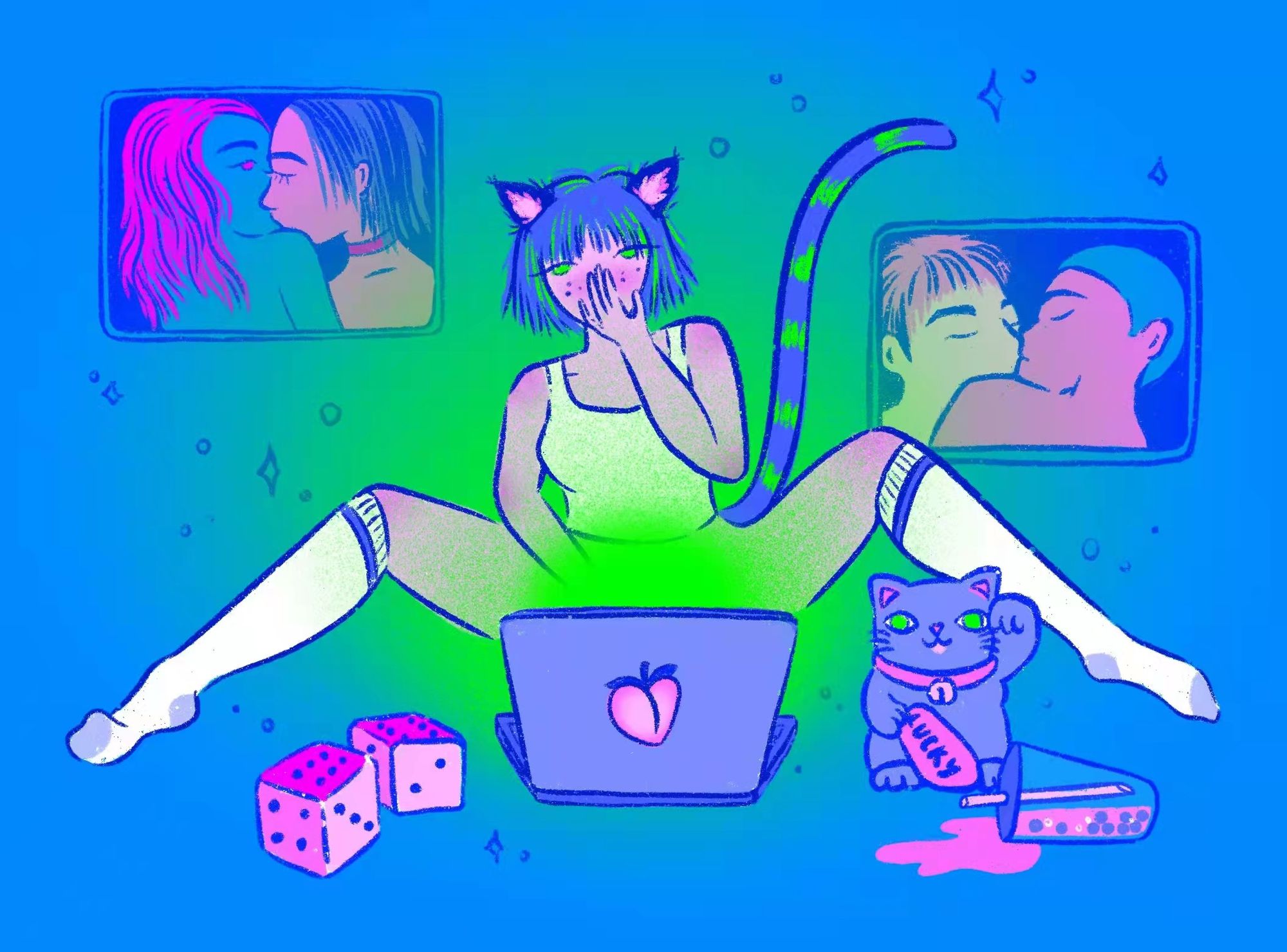In the house this week: Chong, Runze, Jen, Simon, Yi-Ling, Krish, Tianyu, Jaime, and 咸湿佬.
Krish: Hello. Just a heads up before we um get into it: 🔞 everything that follows is NSFW.
In this episode, we’re talking about pornography and desire in China. We discuss why porn matters, how sexualities are constructed, and where these conversations unfold. We try to delineate between porn culture and actual porn, to look at what that tells us about everyday life on the Chinese web.
Tianyu: As Jiang Zemin told Mike Wallace in his famous 60 Minutes interview, the Chinese government’s initial justification of internet censorship was that they needed to ban pornography (“sometimes there is also unhealthy material [on the internet]—especially pornography on the Internet—which does great harm to our youngsters," he said).
But ironically I’ve heard many anecdotes of people having learned about censorship circumvention tools not because they were interested in dissident politics, but that they had to use a VPN to watch porn.
Yi-Ling: The cute cat theory, except the cute cat is porn.
Tianyu: This had the adverse effect of, well, people curiously tiptoeing around political boundaries after being introduced to the uncensored internet originally for the purpose of porn consumption.
Krish: Porn is, to quote Richard Dyer, “too important to be ignored, or to be left to the pornographers.”
The heart of this episode is a conversation between two incredible researchers—Chong and Runze—swapping field notes, thoughts, and theories with the rest of the group. We cover everything from powerful yearning to whatever stage of horny this tweet represents:
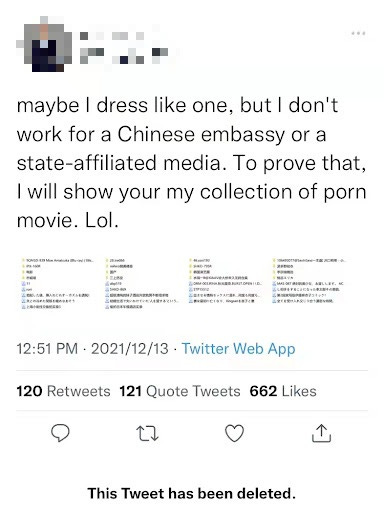
We’re so excited that Chong and Runze agreed to talk about their work here. Chong Liu is a sociologist who researches youth experiences with sexuality education and social stratification in China, and is also a teacher and consultant on sexuality education. She's done fieldwork among high school students around Tianjin. Runze Ding is a post-doctoral researcher whose work spans porn studies, new media, and online queer experience in China. He has done fieldwork with local gay communities in Beijing and Guangzhou, interviewing over 80 demographically diverse gay men about their lives and sexuality.
Over to you both and, again, a reminder:
This episode is 100% NSFW.
[DOC/36K] 【CYT0207】ChaoyangTrap.avi
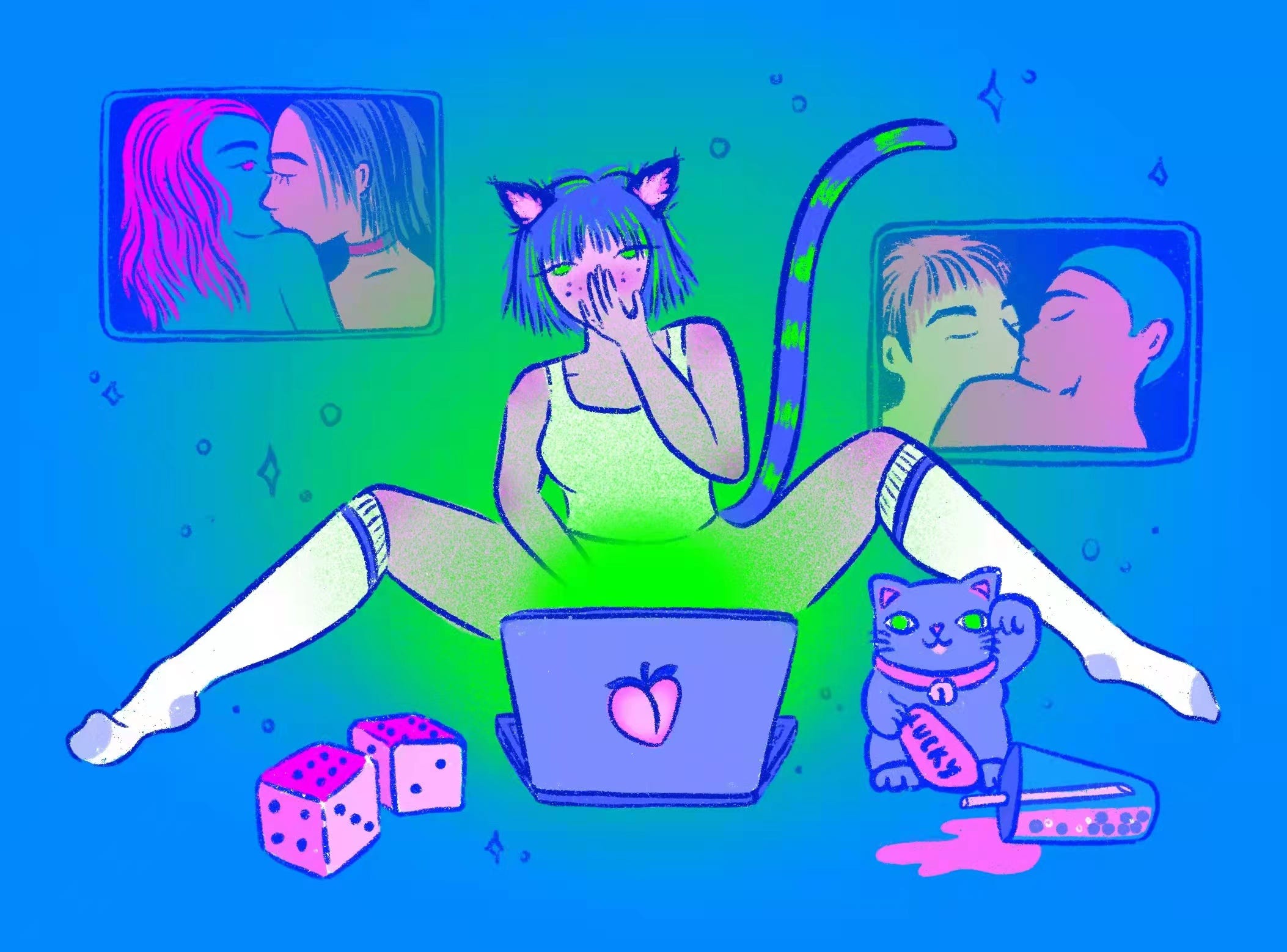
Chong: Let’s start with some fundamental premises.
1: Porn is a cultural product in China.
We can see it as the output of overlapping social, cultural, and political contexts, a means to help unpack the youth experience.
Runze: This is so true. Porn matters as a cultural phenomenon, and it especially matters to gay men. Richard Dyer defines gay porn as “a form of representation that can be the site and occasion for the production of bodily knowledge of the body.”
There is high demand for locally-produced (both amateur or semi-professional) porn videos within the Chinese gay community, which suggests that the reason for this “popularity” is not just novelty but also the big gap they fill in the market. The visibility of sexualized Chinese gay male bodies, per se, has cultural and political significance. A means of showing gay men’s “ability to do sex.”
Chong: This leads to our next premise.
2: Porn has a long history in China, and that history informs the present.
It’s notable that the oppressed social and political circumstances of the last half century did not reduce, well, horniness, even if porn could lead to arrests and punishment. The popularity of so-called hand-copied literature (手抄本) during and after the Cultural Revolution is revealing about how youth at the time experienced their sexuality. They would reinterpret the literature they were exposed to while copying, adding descriptions about lesbian sex, exotic places and so on. These risky reinterpretations show how the youth, subjectively, wanted to access sexuality-related information and challenge the mainstream discourse about sexuality even during peak Maoism.

About half a century later, when I conduct my fieldwork and interview my student participants, almost every single one of them can talk about porn. Some of them even share the names and features of their favorite porn stars with me without feeling timid. These include Chinese stars (from unlicensed porn-centric apps and websites), some Japanese ones (e.g. Sola Aoi, Yui Hatano, and Erika Momotani), and some white actors (they did not remember their names but did remember their faces).
Runze: Yes, Chinese gay men are also certainly not shy or reticent in talking about their porn consumption. Some of them are even willing to share their experiences of producing pornographic content. In a recent co-authored study, which explores Chinese gay men's self-made sex videos on Twitter, I also found that many Chinese gay men are more open about this subject than I would have expected. Reflecting upon my experience, I believe pornography is not a taboo topic for many young Chinese (gay) individuals who were willing and happy to share their stories about this.

Chong: That said, there is a paradox here: this “openness” is set against a reluctance, a suspicion, a kind of moral judgment, whenever porn is mentioned. This is our third premise.
3: Porn is illegal in China, and this illegality colors the manner and texture of its consumption.
This dynamic within the porn ecology in China is quite note-worthy. Referring to the policies and laws, such as the Criminal Law of The People’s Republic of China (1997) and the Law of the People’s Republic of China on Penalties for Administration of Public Security (2006), nobody can access porn legally as it is against the law to manufacture and disseminate porn. Watching porn, although not technically illegal, still could carry risks since “producing, transporting, duplicating, selling, and renting out” porn could be seen as breaking the law. Moreover, the definition of each is not usually clear.

Hand-in-hand with this “transgressive” reality is porn’s connection with aspiration. One of my fieldwork participants, a boy, told me he thought watching porn was like a habit to him, and it maybe even had nothing to do with his sexual desire. He had two elder sisters, and he was the little son in his family. His parents, therefore, had set a “high standard” for him and wished for him to go to one of China’s top universities. Referring to a study focusing on youth porn watching in Taiwan, the motivation behind habitual porn watching is linked to high expectations from parents and society. Porn thus becomes a shelter to youth to help them escape the pressure, frustration and boredom in the competitive circumstances brought on by the implementation of the One-Child Policy and neo-liberal demands.
A short Arrow Factory documentary about the market for high-end sex doll manufacturing in China.
Runze: The anthropologist Lisa Rofel writes in her book Desiring China that “the specificity of neoliberalism in China lies in the production of desire”. I am in total agreement—the idea of “desire” is the key to understanding China's social transformation over the past several decades. What is more related to the idea of “desire” than porn? By understanding how porn is produced and consumed in China, the complexity of the construction of sexualities in China can be unpacked.
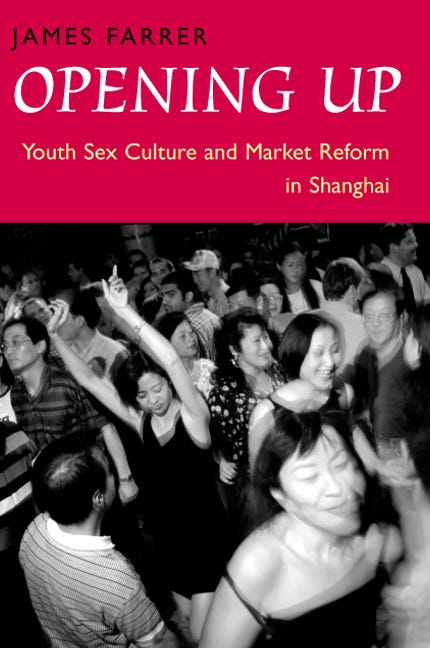
Chong: In the late 80s, and especially after the student movement in 1989, porn was assumed to be the result of bourgeois liberalization, a symbol of a “decadent capitalist way of life.” It was common to link porn watching to criminal activities, and to link “deviancy” in sexuality to crime. The specter of hooliganism (流氓罪), raised in the 1970s, and although retired in 1997, still has a deterrent impact on society. The word “hooligan (流氓)” is still frequently used in a school setting, and in my research amongst youth, the ones who talked about sexuality-related topics, even if just to express their confusion, told me that they would be gossiped about or publicly shamed.
That reminds me of a very interesting thing that happened recently. I went to the pub near my university in the UK with a group of Chinese PhD students. After I introduced myself, a female PhD student slut-shamed me and asked, “how many men have you ever touched?” I was (and still am) not even close to her!

Runze: I think there are also political and technological dimensions in reading, watching (or producing) porn. We need to stress that the making and distribution of sexually explicit materials (homosexual or heterosexual) is illegal in China, and the government has increasingly tightened its control and censorship of pornography on the internet. Despite these efforts, it is not difficult for the public to access porn, particularly for those who live in more economically developed areas.
Results from the 2006 Sexuality Survey of China showed that 51.1% of participants had seen sexually explicit media content (such as images and videos) in the year before the survey was conducted. By 2010, this percentage had risen to 65.8%, of which 25.9% had actively searched for sexually explicit content, including texts, pictures and videos. VPN use is common since the Great Firewall actively blocks most porn sites or platforms where porn might be hosted.
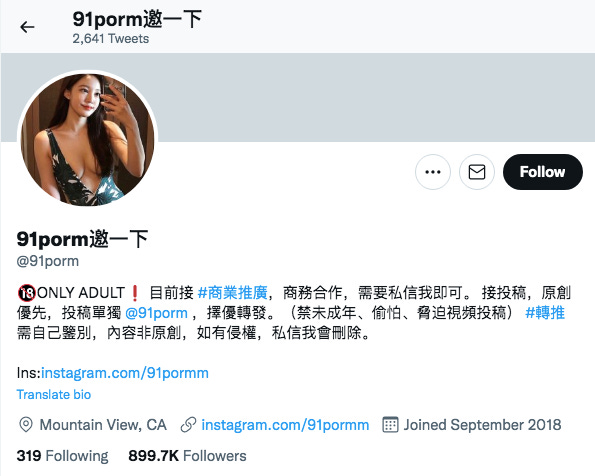
Tianyu: The most popular board on Caoliu (草榴社区), China’s most famous porn BBS, is a current affairs forum known as “technical discussion area” (技术讨论区). In between NSFW posts are, in fact, uncensored discussions about international politics and domestic policy, as well as reposts of censored WeChat articles.
But I think this porn-to-politics, nudes-to-news pipeline has also shifted to Twitter, where a lot of Chinese people came for the porn and stayed for the minyun keyboard warriors (mostly men) of Sinophone Twitter.
In most of these circles misinformation is rampant, and most are bad takes; still, I’d love to read a paper on this if anyone is interested in an investigation.
Chong: Despite the hard censorship, Chinese people can and always find ways to access pornography. I remember during the first day at the vocational school which was my research site, a few boys approached me during their lunch break in the playground with my research information sheets in their hands. They asked me the reason why I wanted to carry out this research. ‘You research sexuality, right? Is it not about porn and all that mature stuff?’ they giggled, and then one of the boys continued to ask, 'would you not feel shame when you talk about them?' I soon identified it as an opportunity to build rapport with them by saying that there was nothing right or wrong in talking about sexuality, and it was all about personal choice to watch and read porn. After hearing my response, these boys were no longer confrontational and showed their strong interest in my research, then asked me how they could participate in my project.
Runze: I also experienced a similar thing in my fieldwork. When I asked my participants how they “realised” their same-sex desires, many of them answered “porn”. Some individuals found that when they were watching straight porn with their mates, they were less attracted by the female actor, but rather stimulated by the male ones. Some participants also told me that it was watching gay porn that let them “confirm” their sexuality.


Chaoyang TrapS02 Episode 2: Press F to Review BombIn the house this week: Aaron, Yuxin, Jason, Christina, Simon, Krish, Tianyu, and Henry. Krish: Welcome to Episode 2. This is the first in a two-part series about video games in China…Read more5 months ago · 8 likes · Tianyu M. Fang
Yi-Ling: I wonder how porn is defined and categorized, and how that definition has perhaps shifted over the last three decades (especially, when it comes to defining legality of content.) Is content that contains same-sex desire more likely to be labelled as “porn” than heterosexual content that is not? (i.e. Danmei literature?) I also wonder how porn fits in the discourse of the “vulgar,” as labeled by various state censorship organs. Is there an overlap between pornography and the “vulgar?” Or are they now kind of siloed into two wholly separate categories, in the eyes of content consumers and content regulators?
Krish: Just from my specific niche as a former social media manager for Chinese brands, most platforms just use crude, sometimes hilariously excessive, filtering for “黄” content that they see as pornographic. Images I've had to delete after being labeled porn have included, over the years, photos of crowd surfers, an illustration of a baby in a onesie, a punk band singer screaming into a mic, and a beer poster that was vaguely flesh colored.

咸湿佬: We talk about this a little later on, but I think it’s worth emphasizing that (although I guess maybe Chong or Runze would have some actual data on this) the heavy regulation of porn in China seems like it has actually resulted in a lot more amateur porn in China than other markets. That heavy reliance on amateur porn to fill the ‘gap’ has also created huge online communities that I don’t feel like exist at the same scale elsewhere—I don’t know if there are really any sites in other places that have the level of activity or influence that Caoliu or 91porn seem to in China, especially given their specific cultural localization as compared to global sites like Pornhub.
Taiwanese porn studios are also another interesting aspect of this - I don't know anything about the history of cross-straits porn relations, but it seems like the popularity of professional Taiwanese porn producers like Madou Studios (麻豆) in recent years is an example of companies filling the gap left from censorship cutting off the supply of local, professional porn content.

Chong: During my fieldwork, many student participants told me that Japanese porn was their “enlightener.” It is worth mentioning that Japanese porn is the most common type mentioned among all my student participants. Japanese porn first entered China in the 1990s, and its popularization in China is a fascinating cultural phenomenon alongside China’s social transformation.
In the famous online community Caoliu, there are different categories available for people to download—Asian porn censored, uncensored, European and American porn, animated porn, Chinese porn, porn with Chinese subtitles and so forth.
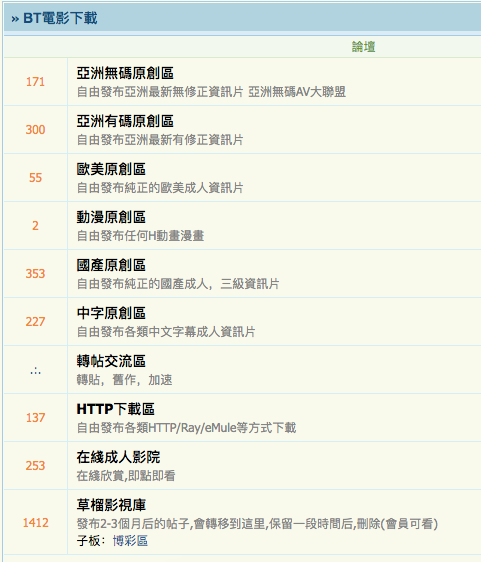

The popularization of Japanese porn can be seen as a kind of decentralization of Western-country-dominated discourse about globalization in East Asia. Moreover, the imagination of 'being modern,' based on China and Japan's cultural similarities, could hardly be negotiated solely by American culture. In one of my interviews, a high school kid could not wait to tell me about his “taste” for porn. He told me he liked Japanese porn more than European and American porn. He explained that “we look more similar and it can help me imagine that I am having sex with my girlfriend”. This similarity in East Asian Countries, to some extent, also rationalizes the popularization and acceptance of Japanese porn amongst youth.
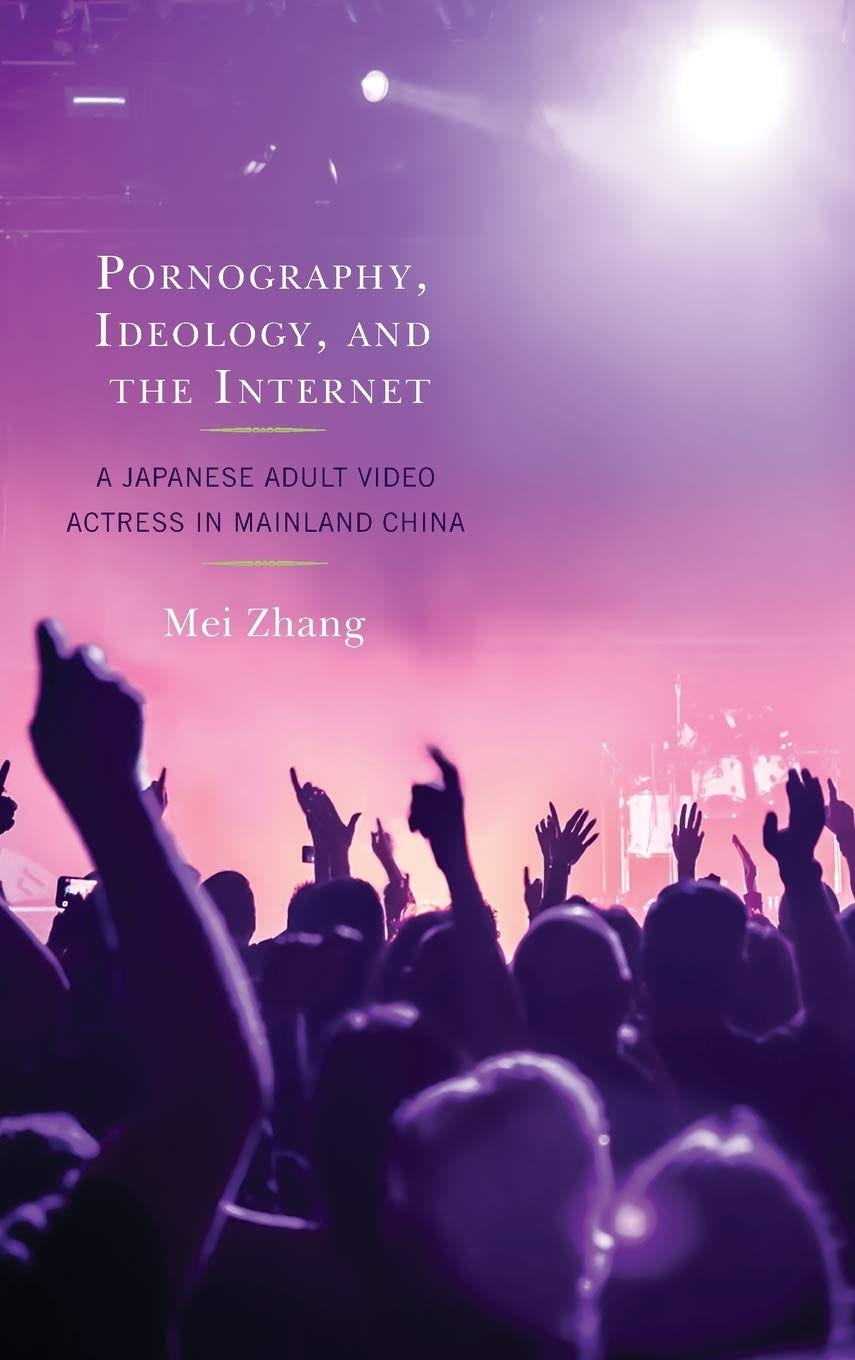
Runze: yes, Japanese porn was also very popular among Chinese gay communities. But there are also many gay indiviudals that fancy western “studio” gay porn. Facilated by the internet, some young Chinese gay men have already developed a specific taste towards western gay porn production from a very young age—a kind of transnational sexualization of culture. Within this context, a few participants reported a strong preference for Western (white) men. They jokingly use the term “western food girl” [potato queen/西餐妹] to describe themselves. Arguably, a Chinese modernity has bought into Western gay attitudes towards sex and gay (porn) aesthetics, seemingly supporting filmmaker and researcher Katrien Jacobs’ claim about ‘erotic-cultural imperialism’ in China. She points out that sexual imagination here has been hijacked by a peculiar kind of “euramerican” style and suggests “a reclaiming of Chinese sexual bodies through “home-made pornography content [that] would be important to even out dominant scripting of eroticism and perversity by overseas producers.”

Chong: Compared to boys, girls were more likely to deliberately search for (or admit that they had searched for) gay porn and Boys Love (BL) comics and literature. BL and gay porn filled in an important gap in China’s inadequate sexuality education. A girl participant told me that, to a certain extent, she obtained knowledge about the existence of sexual minorities and understood civil society according to her active exploration of BL and gay porn. Due to governmental suppression of sexual minorities’ rights, knowledge about LGBT issues is often deliberately obscured and hidden. Even though, taking a long view, the situation is much better than in previous years—at least homosexuality is no longer identified as a mental health disease since the mid-2000s.


Some girls also told me that compared to heterosexual porn, they prefer to watch gay porn more than other types.
The reason: in heterosexual porn, women are usually exploited, degraded and objectified and it made the girls feel uncomfortable. Gay porn, then, provides girls opportunities to get away from widely existing binary gender stereotypes and opt out from the manipulation and unequal power relationships (at least in personal media choices). From Japan to China, from the submissive to the grass-roots, in the trend of social transformation, porn is a double-edged sword—a battleground. It has given multiple possibilities to different people to deal with gender (in)equalities in society.
Runze: Interestingly, and more recently, there is a rise in the locally produced gay porn market that is challenging this “erotic-cultural imperialism.” Around 2010, a series of locally produced gay porn films under the brand name “Chitu” (赤兔) has gained popularity among gay men in China. Arguably Chitu can be seen as the first gay porn series in China. Following the success of Chitu, there are more and more individuals and groups take part in the local gay porn production in China.

Although the production of Chitu has stopped, similar forms of homo-erotic media and gay porn productions are actively continuing in corners of the Chinese web. For instance, another series of locally produced gay porn films under the brand name ‘A Big Cock Man’ gained popularity in the Chinese gay community beginning in late 2016. With the popularity of Tumblr and later Twitter, more and more ordinary Chinese gay men also become DIY porn producers.
These DIY porn creators are often referred to as wanghuang (网黄), a term derived from wanghong (网红, “internet famous”) swapping the “red” for “yellow.” A recent paper by Lin Song offers a really fascinating insight into the phenomenon, arguing that wanghuangs represent both a willing submission to, and an active negation of, commodification and state censorship.

Chong: Wrapping up, we should talk about porn’s affects in China, and how it functions as education in the absence of comprehensive sex-ed.
One of my student participants, a 17 year-old boy, told me that he usually felt guilty when watching porn and swore not to watch it anymore. Part of his guilt was about morality - he felt he was breaking the law every time he watched porn. Having been identified as 'spiritual opium', 'yellow pollution' and 'spiritual poison' by the public and even the authorities, porn is usually being sold as an entirely negative thing to youth. While on the other hand, these nicknames explain why youth cannot resist porn as a transgressive pleasure.
It is actually a very tricky situation. I have multiple roles in the field of sexuality education—I research, teach, and consult. As a sociologist, I can confidently say that the youth benefit when they watch porn. To be specific, it can help them release pressures and at least have some fun and explore their identities. However, as a teacher and a consultant, when I cooperate with the authorities and schools, it becomes unrealistic to mention the positive part of watching porn to youth, because practically, it is still vital to follow the rules and the law.

Runze: Interestingly, not many of my gay participants felt guilty when watching porn. For the majority of (young) participants, when they first started to explore their sexual identity online, they would naturally encounter pornographic content. Specifically, for many participants from post-1980s and post-1990s generations [80 后和 90 后], the Internet has become Chinese gay men’s major (if not only) information source for sexually explicit materials. In fact, when many of my younger participants accessed information on homosexuality online, they found that sexually explicit material was the first thing that turned up, which suggests that homoeroticism is inseparable in the construction of gay identity. However, this access is not free from censorship or state control. Many participants noticed the government’s tightening-up censorship on Internet (gay) pornography. They often expressed that getting access to gay porn online was much easier when they were younger.

Chong: Porn stars are often called 'teachers' by youth in China, including by many of my student participants. Simultaneously, some of my student participants looked to porn for answers when there was no one to ask for help. For example, some of the girls I interviewed told me they did not know where to ask sex-related questions. Compared to boys, they found talking about sexuality to peers was a difficult task.
▲ A series of hand-drawn sex-ed videos, now deleted from the Chinese web, that went viral in 2014.
Another participant of mine told me that he learned a lot about sexuality through porn. He specifically highlighted knowledge about contraception—through porn watching, he learned that ejaculating on his sex partners’ bellies could be an efficient way to avoid making girls pregnant. Ignoring the accuracy and leap of logic in this particular instance, porn had some educational benefits to almost all of my participants, caused in part by the conservative attitude towards sexuality. “The underground circulation of pornography” functions, in a sense, as an informal educational network. In this case, calling porn stars 'teachers' and using porn as a critical learning material shows the everyday encounter with sexuality in youth’s lives.. It also expresses an attitude of resistance against 'the dominant belief that "pornography is poison"' widely advocated by China's legal system and mass media.
▲ “Why Most Women Hate Oral Sex,” from popular sex-focused video channel ChaoZhiBai (超直白)
Runze: This is so true. Like I mentioned earlier, the internet has become the major source for Chinese gay men to explore their sexualities. Digital technologies provide sorely needed alternative spaces for LGBTQ folks to acquire and practice sexual knowledge. The internet creates a relatively safe space where gay men are empowered to satisfy their curiosity, learn about sex, and talk about topics they would unlikely discuss otherwise.
Tianyu: On the subject of online communities, a few other random things about Caoliu:
- The website never got banned banned. Their main domain has long been on the GFW blacklist, but they’ve managed to mirror the site on different servers and temporary domains. You can always find a list of their most recent mirror URLs in one way or another, somewhere on the Chinese internet.
- Caoliu had a reputation for the civility of its users. Quarrels were very rare because community rules are strictly enforced; since the site is invitation-based, and they stopped handing out new invitation codes long ago, I imagine no one is willing to get their handle permanently banned so that they could win an argument. (You need an account to add or reply to posts, but anyone can browse/download.)
- New users on Caoliu needed to wait at least 1024 seconds between two replies. For whatever reason, people on Caoliu started writing “1024” in the comments to thank the OP. But this practice was later introduced to non-porn BBS forums, so it wasn’t uncommon to see entire threads of “1024” on SFW messaging boards.
Simon: I feel slightly awkward commenting on this as a straight white man but in any case, porn seems like another interesting example of a cultural space in China defined by absence. I remember once hearing that sex shops used to be so ubiqituous in Beijing in part because porn was illegal, and thus “sex” had to be sold another way.
What do people think the future of porn in China will look like? Runze mentions that it has gradually become more difficult to access gay porn online; I wonder if changing heterosexual mores might bring straight porn more into the open? If high birthrates are being encouraged these days, does that make (heteronormative) desire good in the eyes of the state? As noted above, porn is often an escape from reality rather than oriented towards real life (reproductive) sex, so perhaps the connection here is tenuous, but I wonder how attitudes and laws might change.
Krish: More a comment than an answer, but it’s fascinating to see how erotica and nudity have become such signficant presences at any art book fair in China, or at illustration fairs like Singularity Plan (奇点计划). There’s an overlap there with slash culture, which will be the subject of a future Chaoyang Trap episode [doge].
Jaime: Lin Song put it well when he describes “illiberal homonormativity" as “a situation where consumer culture functions as one of the very few, if not only public channel for queer expressions and negotiations under illiberal rule" and “the marriage between queerness and commerciality may be at once enabling and restricting, liberating and normalizing, and apparently assimilationist and tactically oppositional."
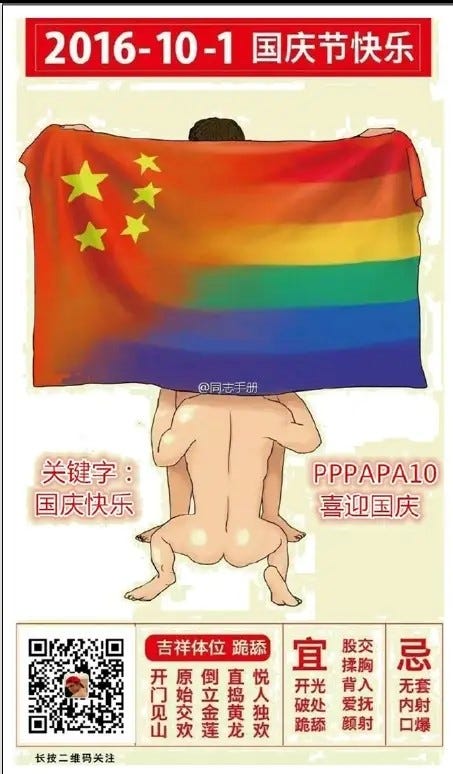
He speaks explicitly to the production of DIY gay porn and the consumption of homosexual culture but I think this can apply to other kinds of imported subcultures (sexual, underground, or otherwise) that are seen as threatening to the heterorthodoxy of the state. this is how we get publications like MISSIONARY—issue 3 is dedicated to porn—which, while a necessary corrective to the invisibility of gay media, aestheticizes queer and sexual culture in a way that lacks self-consciousness about the way class—and capitalist relations, and capitalist relations with Chinese feudal/hukou characteristics—functions to enable or disable sexual power.

Mainstream society co-opts or accepts deviant sexuality in so far as it also upholds values that are in service of maintaining other categories of social hegemony—think about how MISSIONARY is bilingual, pro-VPN, and quotes no less than three European philosophers in each issue. This is, by the way, connected to the thesis of Christopher Chitty's Sexual Hegemony, which crucially (and mindbendingly) proposes a Marxist framework to account for the policing of homosexuality at various urban junctures throughout the rise of capitalism. Chitty stops at American bourgeois hegemony in the 20th century (RIP) but what I would give to read the unwritten chapter on how Chinese sexual history fits into the development of China's demented form of capitalism, common prosperity/xiaokang society policy goal, and its unique population (control) struggles outside of Western liberal order.
咸湿佬: Personally, I look forward to the evolution of porn advertising, where China is already on the bleeding edge of innovation. This randomly selected video is a great case in point:

- the actors are playing a mobile poker game being advertised in the video
- this clip is immediately followed by an actual embedded ad clip for the game
- there are printed signs in the room advertising the game
- there are digital overlays on the video repeating the same ad!
And this one isn’t even pushing the boundaries - there are also examples of native ads like the porn site being displayed in a billboard in a passing shot, context-aware bouncing ads, temporary tattoos on actors’ bodies, and more…who knows what the future holds.
(If you are the person who makes these ads and you happen to see this newsletter, please contact @ChaoyangTrap, because we have…questions.)
Krish: Outro music this week is the lead single from the new Absolute Purity album. “Baroque sludge post-punk” is my attempt at describing the sound.
It’s a great direction for this band. Singer Wen Jun used to front beloved short-lived noise rock outfit Guai Li, and this takes just the right amount of nostalgic inspiration from the 2010s Beijing scene and pushes it into fun, noisy, gothy, poppy territory.
Tianyu: Bye!
Chong Liu is completely safe for work. She is also interested in the sexual abstinence culture in China.
Runze Ding is a post-doc researcher in Shenzhen where he cannot say he is studying porn out loud. He hopes to find a job position in which he can do more “sexy” research projects.
Jen Rao aka drift & dune is an illustrator and artist based in Beijing, and the co-founder and creative director of nugget records, a DIY cassette label and venue.
Krish Raghav is a comic-book artist now based in Amsterdam. His attempts at drawing erotica always turn into body horror :(
咸湿佬 works 996 hours but is NSFW.
Yi-Ling Liu learned earlier this month that the first sex shop in China was called Adam & Eve.
Simon Frank wanted to write that he lives in Beijing’s sexiest district, but then realized if he looked up “Beijing’s sexiest district” online he’d be very disturbed by the results.
Tianyu Fang is visiting Amsterdam in two weeks. He drunk-tweeted on August 19, 2021: “chaoyang trap season 2 on onlyfans.“
Jaime (bot) is still trapped in Chaoyang.
